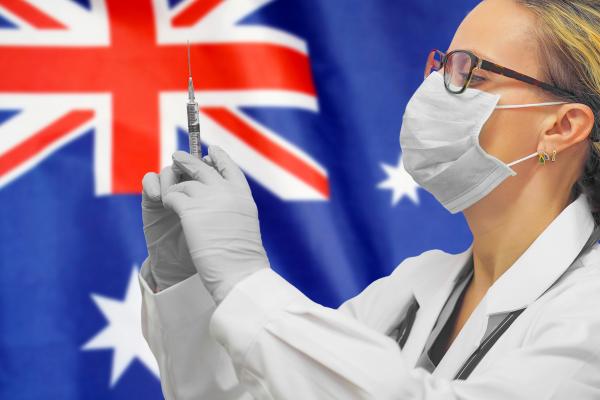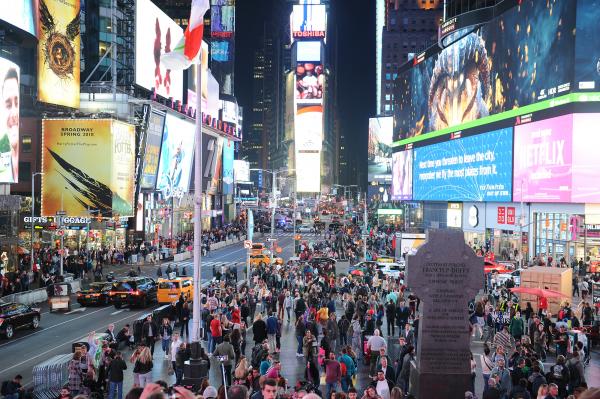Australia’s botched rollout of the Covid vaccines has resulted in a steep fall down the ladder in a global index of how countries are faring in the pandemic.
The respected New York-based Bloomberg news agency’s Covid Resilience Ranking, which previously had New Zealand at number one and Australia two, dropped New Zealand to second at the end of June, with Australia plummeting to seventh of the 53 countries surveyed. The United States, which still tops the world for Covid deaths, at more than 605,000, now also leads the world on the Bloomberg index thanks to a more than 50 per cent vaccination uptake and a booming economy as cities and towns return to normal.
Bloomberg is the first to admit that it only takes a new wave of a more contagious variant to change all of that in a nano-second, but its complex analysis of every aspect of the global impact of the pandemic, from quality of life to the death count, and now the new element of “reopening progress” has made compelling reading since the ranking was introduced last November.
Introducing the June figures last week, Bloomberg wrote: “Almost a year and a half into the pandemic, the best and worst places to be in the Covid-19 era are increasingly defined by one thing: normalisation. The biggest vaccination drive in history is enabling parts of the globe to abolish mask mandates, relax restrictions and dismantle border curbs, making the magnitude of reopening key to quality of life. Taming cases and deaths was once paramount, along with ensuring a robust health-care system. Now, the ability to essentially turn back the clock and return to pre-pandemic times is taking on an even greater significance. That’s why we’ve introduced Reopening Progress. Two new metrics capture the ease of moving in and out of a place and how much air travel has recovered, alongside 10 other measures tracking mortality rates to infection counts, freedom of movement to economic growth.”
Australia’s decline on the index shows that while Australians can feel proud and relieved that fast action and strict policies on an international lock-out have made us one of the safest nations on earth, having won that battle we are now in danger of losing the war.
As the focus shifts from bringing down death rates and caseloads to becoming normal again, we lag behind while other countries whose suffering has been far greater, overtake us in opening up borders and revitalising shattered economies. The reasons for this are complex, but at the very heart of the problem is the vaccine take-up.
To June 30, almost eight million vaccine jabs had been administered around the country, but only about eight per cent of adults had had both doses. A further 30 per cent had had one dose. After a week of disastrous confusion over who could now have the AstraZeneca jab, Prime Minister Scott Morrison finally came out of a radio silence last Friday to introduce a four-point recovery plan, mostly in the hope of calming the irate Labor premiers, but over the first few days of July it was accompanied by a long-overdue ramping up of the vaccine roll-out.
To see how necessary this is, we need only look at the Bloomberg rankings. Of the top five countries recovering the fastest, only New Zealand, where the Covid model is similar to ours, had fewer than 40 per cent of population fully vaccinated. As of June 27, when the rankings were tabulated, the US had 50.3 per cent, Switzerland in third had 41 per cent, Israel at fourth 59.1 per cent and France fifth at 40.3 per cent. Further down the list at ninth, largely because of recent Delta variant outbreaks, the United Kingdom had 57.1 per cent fully vaccinated. Conversely, at the bottom five of the list only Argentina, with 20 per cent, had vaccinated more than five per cent.
Parts of the Asia-Pacific region that performed well in the Ranking until now—like Singapore, Hong Kong and Australia—dropped down as strict border curbs remain in place and a zero-tolerance approach to small virus flareups limit their ability to reopen. Taiwan plunges into the bottom half of the Ranking for the same reasons, accentuated by a lagging vaccination drive and a resurgent outbreak.
The Bloomberg Ranking notes: “While the failure of powerful, developed economies to curb the spread of the coronavirus remains a lasting legacy of the pandemic and leaves a deep scar—the US, UK and parts of Europe have some of the highest mortality-per-capita rates in the world—these places are proving faster and better at exiting the Covid era, mostly thanks to domination of vaccine supplies. In contrast, the Asia-Pacific economies that have populated the top rungs of the Ranking have seen their fortunes fade.
“Covid havens, like No. 2-ranked New Zealand and No. 13-ranked Singapore, use border curbs and lengthy quarantines to keep case levels near zero. While life internally has largely returned to normal, they remain shut to the outside world with even a handful of cases triggering the sorts of restrictions highly vaccinated places are abandoning. Sydney was put into a two-week lockdown following the detection of dozens of locally-transmitted infections, and Australians haven’t been allowed to leave the country since March last year.
“As others accept that Covid is endemic and move on, these places are at risk of being stuck in cycles of lockdowns … Still, all but quashing Covid, and the internal freedoms that affords has kept places like New Zealand, Australia and China in the top 10.”
The most remarkable turnaround described in the Resilience Ranking is undoubtedly that of the United States. While Trump’s America adopted an increasingly cavalier approach that smacked of policy on the run while anyone who disagreed was shown the door, Biden’s America in just six months has simply gotten on with the job, and the job is vaccinating as much of the population as possible, and doing it fast.
Australia, on the other hand, put all its vaccine eggs in the one wrong basket, and then changed the rules of engagement every five minutes. ABC’s Covid correspondent Dr Norman Swan said on 7.30 last week: “I’ve been covering this pandemic since the get-go, and I’ve never seen as much confusion as there is now.”
Astrazeneca is okay for over 50s, over 60s, or everyone. We don’t know. Scottie from Marketing doesn’t know. Ask your GP. Confusion reigns.
When you look at the clotting statistics, the vaccine is about as dangerous as most of the pills in your medicine cabinet, if you’ve ever read the fine print. It should have been handled as such. Meanwhile, like the US, we need to get over the mountain of misinformation and get on with it.
The final word from Bloomberg: “The Asia-Pacific, which has relied on shutting out the world to snuff out Covid-19—delivering vastly lower mortality rates—scores poorly on reopening. Border closures and onerous travel quarantine requirements help keep the virus at bay, but leave them increasingly isolated. No Covid-19 has led to a lack of vaccine urgency in some places, (including) New Zealand and Australia.”









